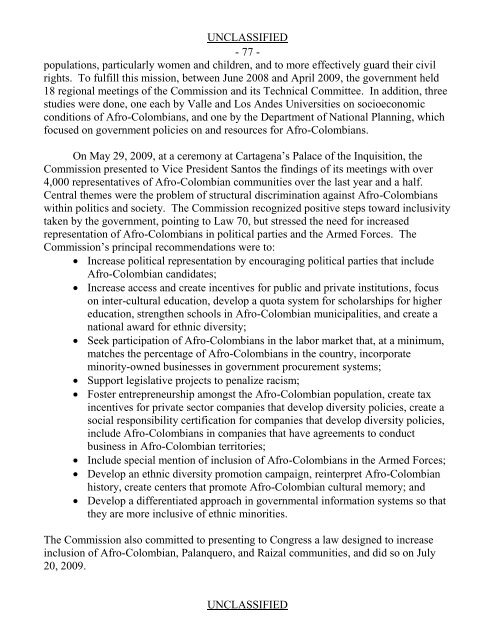memorandum of justification concerning human ... - Just the Facts
memorandum of justification concerning human ... - Just the Facts
memorandum of justification concerning human ... - Just the Facts
Create successful ePaper yourself
Turn your PDF publications into a flip-book with our unique Google optimized e-Paper software.
UNCLASSIFIED<br />
- 77 -<br />
populations, particularly women and children, and to more effectively guard <strong>the</strong>ir civil<br />
rights. To fulfill this mission, between June 2008 and April 2009, <strong>the</strong> government held<br />
18 regional meetings <strong>of</strong> <strong>the</strong> Commission and its Technical Committee. In addition, three<br />
studies were done, one each by Valle and Los Andes Universities on socioeconomic<br />
conditions <strong>of</strong> Afro-Colombians, and one by <strong>the</strong> Department <strong>of</strong> National Planning, which<br />
focused on government policies on and resources for Afro-Colombians.<br />
On May 29, 2009, at a ceremony at Cartagena‘s Palace <strong>of</strong> <strong>the</strong> Inquisition, <strong>the</strong><br />
Commission presented to Vice President Santos <strong>the</strong> findings <strong>of</strong> its meetings with over<br />
4,000 representatives <strong>of</strong> Afro-Colombian communities over <strong>the</strong> last year and a half.<br />
Central <strong>the</strong>mes were <strong>the</strong> problem <strong>of</strong> structural discrimination against Afro-Colombians<br />
within politics and society. The Commission recognized positive steps toward inclusivity<br />
taken by <strong>the</strong> government, pointing to Law 70, but stressed <strong>the</strong> need for increased<br />
representation <strong>of</strong> Afro-Colombians in political parties and <strong>the</strong> Armed Forces. The<br />
Commission‘s principal recommendations were to:<br />
Increase political representation by encouraging political parties that include<br />
Afro-Colombian candidates;<br />
Increase access and create incentives for public and private institutions, focus<br />
on inter-cultural education, develop a quota system for scholarships for higher<br />
education, streng<strong>the</strong>n schools in Afro-Colombian municipalities, and create a<br />
national award for ethnic diversity;<br />
Seek participation <strong>of</strong> Afro-Colombians in <strong>the</strong> labor market that, at a minimum,<br />
matches <strong>the</strong> percentage <strong>of</strong> Afro-Colombians in <strong>the</strong> country, incorporate<br />
minority-owned businesses in government procurement systems;<br />
Support legislative projects to penalize racism;<br />
Foster entrepreneurship amongst <strong>the</strong> Afro-Colombian population, create tax<br />
incentives for private sector companies that develop diversity policies, create a<br />
social responsibility certification for companies that develop diversity policies,<br />
include Afro-Colombians in companies that have agreements to conduct<br />
business in Afro-Colombian territories;<br />
Include special mention <strong>of</strong> inclusion <strong>of</strong> Afro-Colombians in <strong>the</strong> Armed Forces;<br />
Develop an ethnic diversity promotion campaign, reinterpret Afro-Colombian<br />
history, create centers that promote Afro-Colombian cultural memory; and<br />
Develop a differentiated approach in governmental information systems so that<br />
<strong>the</strong>y are more inclusive <strong>of</strong> ethnic minorities.<br />
The Commission also committed to presenting to Congress a law designed to increase<br />
inclusion <strong>of</strong> Afro-Colombian, Palanquero, and Raizal communities, and did so on July<br />
20, 2009.<br />
UNCLASSIFIED



